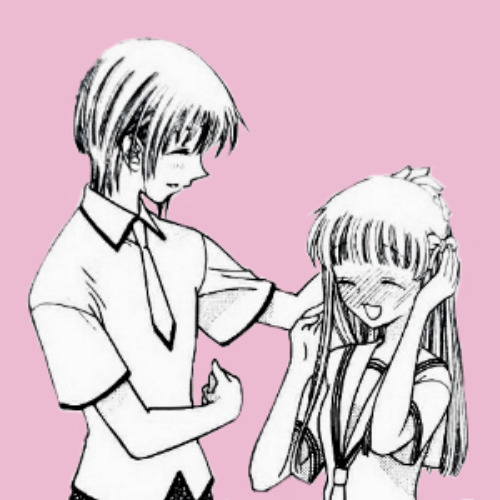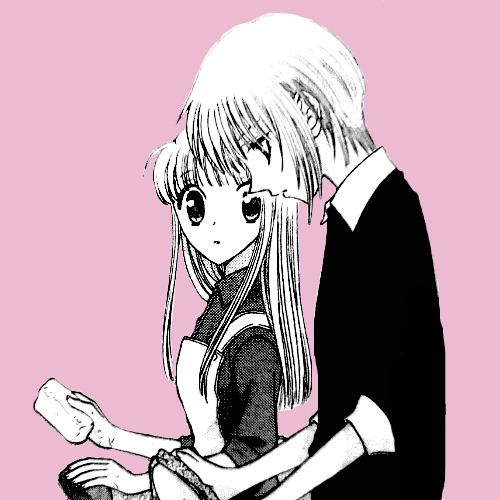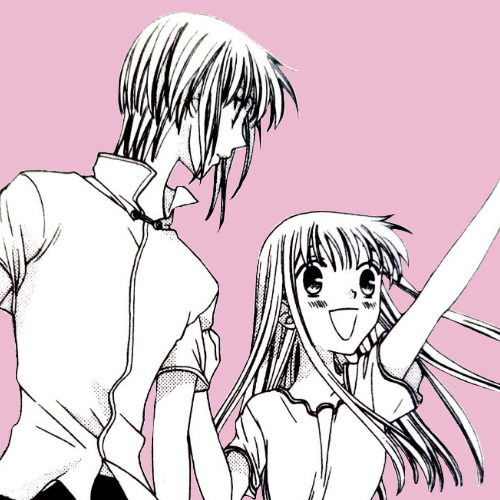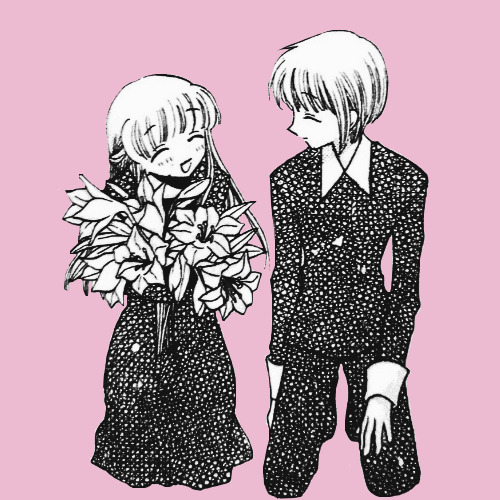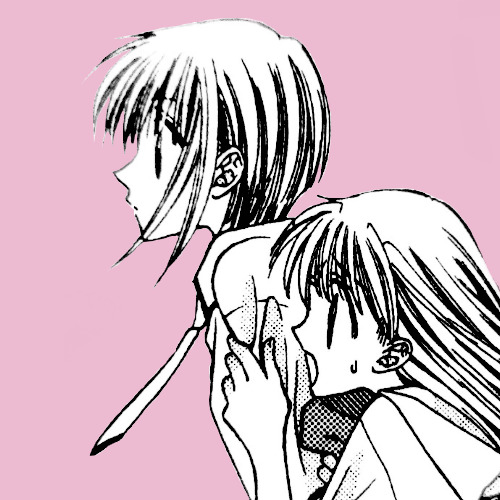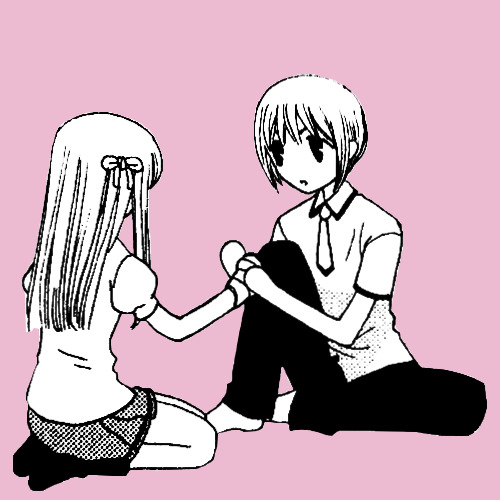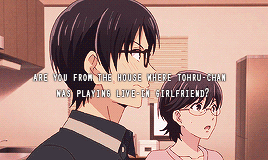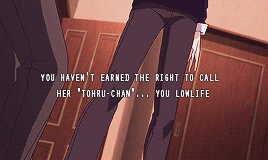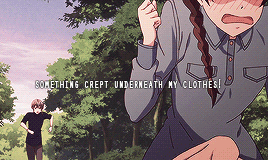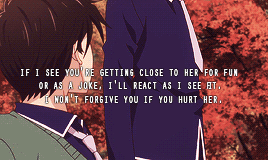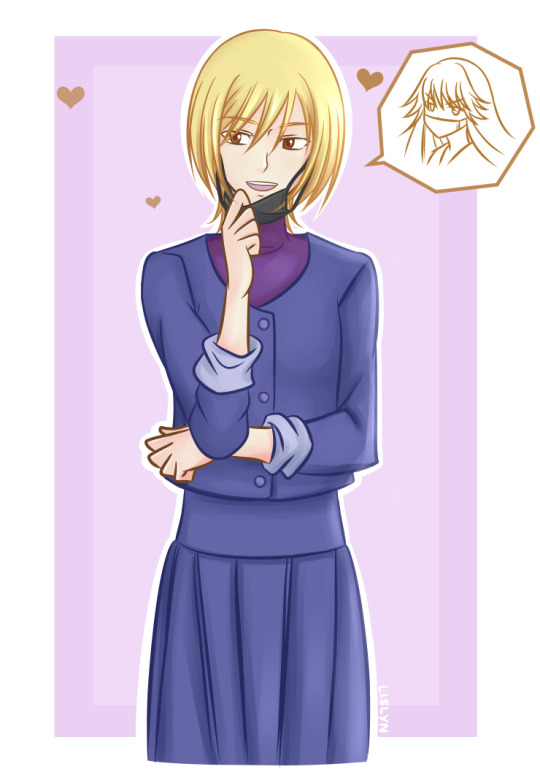Photo



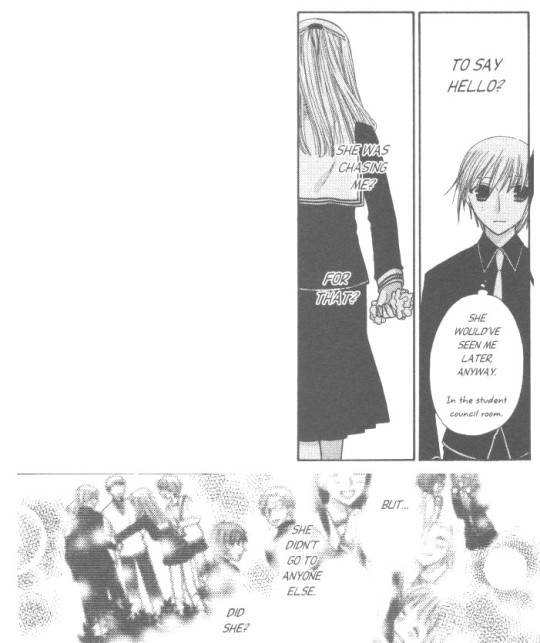
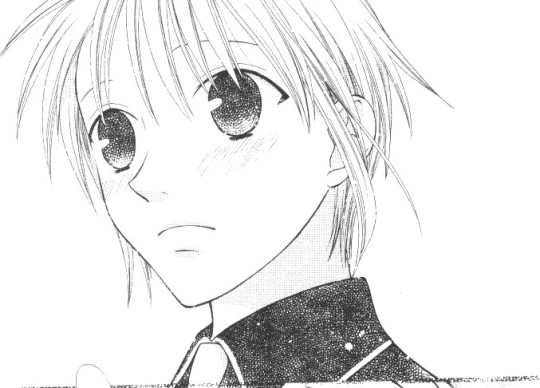
is it because someone in a completely different world actually listened to me? or maybe it’s because… he’s actually very nice. // to say hello? she was chasing me? for that? but… she didn’t go to anyone else. did she?
233 notes
·
View notes
Note
Why does it make you sad? Explain it. (If you don't mind. I know you're not obligated to answer. But I liked her character)
i’m sad about machi because she’s built up to be a really intriguing character, but her development is completely halted and thrown out in order to satisfy her role as yuki’s love interest. she’s an obvious parallel to yuki with her own set of issues that make her separate from him (how she deals with her relationships with kakeru, her mom, herself), but she’s given absolutely none of the same care that yuki was given in order to actually grow with and through these issues. obviously she wouldn’t have gone through the same amount of on-screen development as yuki, but the problem was that she was given zero development at all after she and yuki have their first real, in-depth conversation. while growing through trauma and working through these issues gradually is a core component of a lot of these characters’ plotlines, with machi it feels very much like a “she’s in love with yuki and he’s in love with her, the fallout of her trauma has been cured by love.” it’s absolutely maddening. she ends the story almost exactly as she enters it, which is with no friends, a strained relationship with her brother, and with nothing concrete to show that she’s actually developed in trying to understand herself more as an individual. the only difference is that she leaves the story with a boyfriend, which was a premature decision for her character at best.
from her character, i really, really wish we had gotten any significant growth between her and kakeru, considering their relationship is built to be something that is strained on both sides because of their separate issues coming at odds (which i wrote about a bit here). i also wish we had seen her and yuki have a more developed relationship, particularly in the sense that they have a strong parallel to how yuki’s relationship was with tohru in the beginning of the series -- yuki taking on a role similar to tohru, in which he’s able to reach out to machi and guide her to a place where she can start individualizing, would have been a really beautiful way to show his own growth, too. and we get a little bit of that, but their shoehorned romance cuts that development short, too, leaving them in just the unequal relationship that yuki said he didn’t want, and a relationship that machi is completely not ready to have.
#very true#i do like the yuchi ship but i agree that this comes at an unfortunate expense to machi's character growth#it would have been so interesting to have more fully-developed character arcs for machi and kakeru
46 notes
·
View notes
Text
also even if fruits basket WAS a romance saying it has too much would still be a valid criticism because the sheer amount of romance shoehorned into the series is actively detrimental to the writing. there are still non-romantic subplots to romance-focused works and those subplots shouldn’t be sacrificed to fit into the genre. the genre doesn’t drive a story, it’s just categorization for distribution and audiences
#i really appreciate this thread of posts#furuba was marketed as romance but i think ‘slice of life’ is a better term#fruits basket
90 notes
·
View notes
Photo




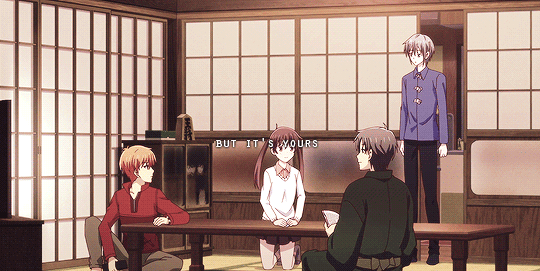


I’m home with my new family…
1K notes
·
View notes
Photo

IS THIS ENDING THEME PANEL A REFERENCE TO THE VERY END OF THE MANGA???? IS THIS A DIRECT PARALLEL TO THE LAST PANEL OF THE MANGA??? I’M GOING TO CRY OH MY GOD
#reading the responses re: whether this is yuki’s or kyo’s hand#and it does look like kyo’s hand#so i stand by it ツ#i agree that it does look like kyo's hand#at the same time though#while there is a good chance that this is a reference to the grandparents!kyoru scene#the yuki tohru handshake felt much more like the true ending of the story to me#(with the kyoru scene as a cute epilogue)#especially because after tohru yuki is intended to be the other main protagonist#and frankly i think ending on the yuki tohru handshake makes more sense thematically#because i do think the show is intended to be a family drama or slice of life not just romance#so i stand by this hc ツ
161 notes
·
View notes
Photo

IS THIS ENDING THEME PANEL A REFERENCE TO THE VERY END OF THE MANGA???? IS THIS A DIRECT PARALLEL TO THE LAST PANEL OF THE MANGA??? I’M GOING TO CRY OH MY GOD
161 notes
·
View notes
Photo




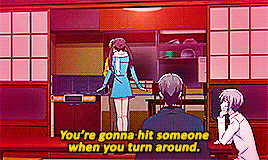

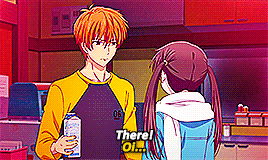

So it’s yours? Glad I didn’t guess wrong. It was lying all crumpled in the street.
S02E24 vs. S03E01
requested by @deathbyfiction
643 notes
·
View notes
Photo





♥*♡∞:。.。ᴛʜᴀɴᴋ ʏᴏᴜ ꜱᴏ ᴍᴜᴄʜ, ᴋʏᴏ! 。.。:∞♡*♥
1K notes
·
View notes
Text
obviously ship what you want! but i do want to discuss one aspect of fruits basket that takaya wrote so well: it’s how, with tohru, yuki, and kyo, she fakes you out to think it's a love triangle. but once you get to the end of the story and have the full context, you realize you were only “tricked” by the structure of the text and never by the actual text itself.
by the structure, i mean that the first act in particular alternates pretty evenly between yuki-tohru scenes and kyoru scenes. this repeated flip-flop between the two “pairings” is typical of a love triangle set-up. it essentially tricks you into thinking that the whole point is “which boy will she choose,” but fruits basket actually ends up being very subversive in this regard. once all of the characters’ feelings are revealed throughout the story (particularly after chapter 84, aka yuki’s realization and acceptance of his platonic love for tohru), it quickly becomes clear how different these scenes are that feature the two “pairings,” with regards to their tone, development, and overall meaning.
both relationships share so many meaningful scenes with great development, but they're meaningful in incredibly different ways. particularly, takaya absolutely nailed the tonal difference of platonic interactions vs romantic ones when writing yuki and tohru’s relationship vs kyo and tohru’s.
with yuki & tohru, there's an innate comfort and peacefulness in their scenes. they grow closer and get to know each other more and more throughout the series, but there's no romantic/sexual tension and there’s no push from either person to have that be apart of their dynamic. (it’s particularly interesting to note that yuki eventually realizes that forcing himself to flirt with tohru and forcing romantic interactions with her early on felt wrong and uncomfortable, which reinforces how purely platonic their relationship is.) theirs is a very well-developed and touching portrayal of bonding with someone in a fulfilling, platonic way. their friendship is meaningful for them exactly as it is, with no underlying romance.
meanwhile, as early as the first rooftop scene, kyo and tohru’s scenes really capture the heart-racing, almost anxiety-inducing nature of talking to someone that you're attracted to or are developing feelings for. they're still comfortable with each other as friends—they spend almost the entire manga as just friends—but there's a still distinct underlying tension and attraction present in all of their scenes. it’s clear that there’s something more there from the get-go. this only becomes more evident as they continually push those boundaries with each other and have very not platonic scenes. unlike with yuki and tohru, where yuki’s flirting felt uncomfortable and forced for him (and tohru never really flirted with him to begin with), with kyo and tohru there’s a consistent sense that they’re blurring the lines of their friendship as they bond, flirt with each other, and have more romantically charged scenes.
all this to say, takaya has done really well-done deconstruction of the love triangle trope, where that's what it looks like at first—but upon further inspection, these characters actually have two super different relationships. more than that, i think it’s very satisfying how your first reread of the early manga almost feels like an “aha!” moment. once all of this information clicks in your brain, it’s so clear that yuki and tohru were always going to have a life-changing platonic bond, and it’s so clear that kyo and tohru were meant for each other and were always going to fall in love from the start—even if you were sure you were in for a typical love triangle.
more than the cleverness of how this was written, what i love most about this aspect of fruits basket is that, at the end of the day, both of these relationships (romantic and platonic) are presented as incredibly meaningful for tohru’s arc. it never was about “who would win her love” or “who she would choose.” it was about how two different relationships could be so special and life-changing for her in different ways—and also, for yuki and kyo, how meeting tohru was so important for both of them in, again, two different but incredibly meaningful ways. frankly, takaya went off with this one!
901 notes
·
View notes
Photo
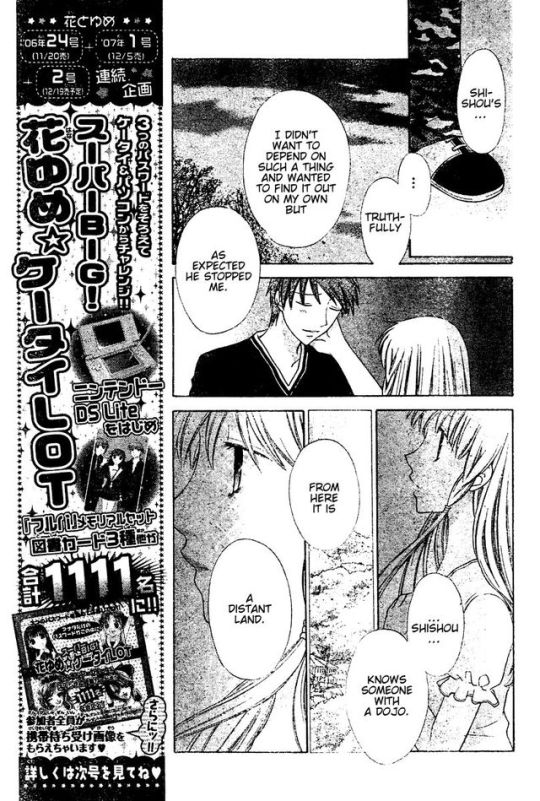


Let’s look back on this scene. Did anyone ever notice that we get a glimpse into Tohru and Kyo’s future? Here, we see that Tohru is probably meeting Kyo at the dojo where he’s training at after her job.
And if you look closely, both are wearing wedding rings!
Edit: from Chapter 135
#amazing!#i never noticed the bit about the wedding rings!#(probably because my eyes are too full of tears by the time i get to this part)#but as others have mentioned#i think this is likely tohru's imagination of what could be#and a very probable future for the two of them#it's just so cute that tohru is already imagining their married life!#kyoru
735 notes
·
View notes
Photo
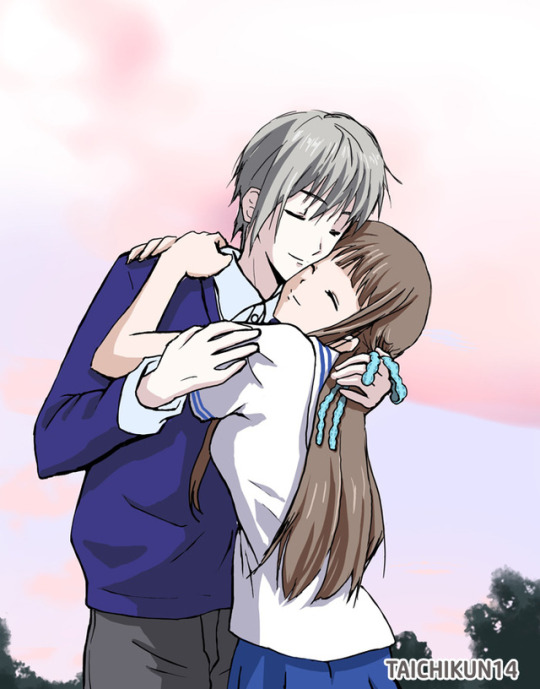
“Let’s stay together itsumo”
(-Okazaki Ritsuko, “For Fruits Basket”)
#THANK YOU#god i was so upset when i didn't get a yuki/tohru hug!#even though taking each other's hands was cute#i want a HUG DARNIT#tohru#yuki#how do you art
216 notes
·
View notes
Text
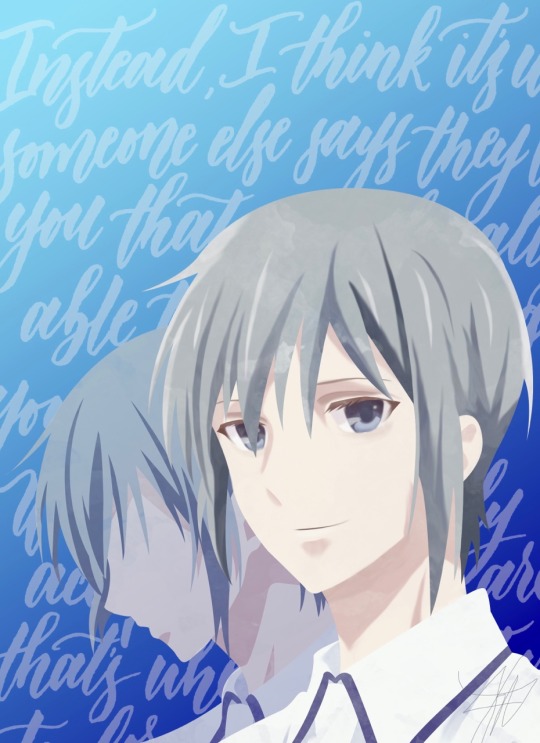
Quick edit of Kisa and Yuki along with an edit of my [2nd] favorite quote from Yuki which took ages bc I kept forgetting the eyebrows lol
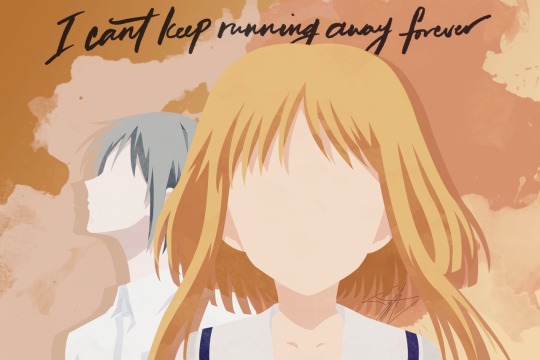
#awww#i wish they showed more of kisa and yuki together#the two of them bonding over their struggles#kisa#yuki#how do you art
115 notes
·
View notes
Text
on tohru and feminism
i want to start by saying: almost every female character arc in fruits basket can be critiqued for not being very feminist, having a non-feminist conclusion, etc.—and you absolutely should critique those! i’m not talking about any of those in this post, especially because plenty of other people already have and i agree wholeheartedly with their critiques. i’m definitely not trying to cancel out what anyone else has said with regards to other characters, and i wouldn’t even say this post is in response to those or an argument against them—but rather, i wanted to gather my own thoughts on how tohru fits into all of this. even though i can acknowledge how tohru’s arc has surface-level similarities to the arcs that aren’t feminist or have other problems, i really don’t think that criticism applies to tohru’s arc itself at all—in fact, i think that tohru has the most feminist arc (not to mention one of the best arcs) in fruits basket.
one reason i feel pretty strongly about this is because i relate to tohru a great deal as a character. i’m very similar to her in personality, disposition, and what we struggle with, and as a result i have found reading her story incredibly empowering—not just as a character i relate to, but specifically as an empowering female character because of the feminist themes within her storyline. obviously not everyone is going to relate to every character in a story, which is absolutely fine! but i sometimes feel like those who aren’t naturally soft-spoken people pleasers, people who maybe don’t struggle to be assertive or stand up for themselves or put their own needs above others, might not quite understand those parts of tohru as well as people who do have those things in common with her.
tohru’s story has many complex facets, but if i had to sum it up i would say it centers around breaking away from not only what is expected of you by others, but more so the internalized things you expect of yourself, and pursuing what you actually want. that struggle is intrinsic to what being a woman and being a feminist means to me. just like we’ve come a long way in acknowledging that women should absolutely be able to pursue their happiness in ways that don’t revolve around being someone’s wife or mother, it doesn’t make a woman any less feminist if those are the things she wants. it’s entirely about choosing what you want. tohru’s arc isn’t absolutely perfect, and a lot of female characters in fruits basket got fucked over by poorly-written romantic arcs, but tohru is not one of them. there isn’t anything inherently anti-feminist about tohru’s arc being resolved with a romance, and it’s actually one of the things that i think does make hers an example of a good feminist arc.
there’s something to be said about how society places value on women being overly polite and always nice and never too assertive, and how that’s not only harmful to women who don’t fit that mold but also to women who do fit into that mold, who feel shackled by it and its expectations of them. tohru begins the story in a constant state of diminishing her own thoughts and feelings, ignoring her own needs because she thinks she needs to always prioritize others to feel like she has value. like i said, we’ve come a long way in not forcing this idea onto women anymore (still have a ways to go). however, i know for me personally that this is still a belief that i have deeply internalized as a woman. whenever i don’t make my thoughts and feelings below or subservient to those of others, especially men, and actually assert myself, i feel like i’m doing something evil or wrong, and i think tohru deals with the same thing. saying “fuck the patriarchy” and easily rejecting it altogether is incredibly iconic, but struggling a lot with and working through those internalized feelings is common and valid, too, and it’s a facet of becoming a stronger feminist for many women.
and yes, tohru’s happy ending is ultimately love and a relationship with a man. but again, i don’t think there’s anything non-feminist about that, especially because it’s in line with tohru and what she values. yes, one of tohru’s biggest goals canonically is to achieve financial independence and support herself after high school—first of all heck yes! that’s feminism babey. but tohru is also an incredibly relationally-motivated person; above all else, she values love and connection, and romance is included in that for her. could takaya have balanced this out by resolving other female character arcs without relationships, to show that romance isn’t the end-all be-all for women? absolutely, that is an incredibly valid criticism. but that has nothing to do with feminism in tohru’s arc itself, and everything to do with fixing the other female character arcs and fruits basket as a whole.
for one thing, kyo is essential to tohru’s arc and the completion of it, but her arc doesn’t revolve around him. it’s made very clear that his presence in her life inspires a lot of her growth, self-reflection, and increased autonomy, but her story is never framed as “i’m ignoring my own feelings and focusing on a man’s happiness by sacrificing my own.” that would be very bad and not feminist (also tbh, if anyone, i’d probably apply that description to rin’s arc with haru, in comparison). but instead, tohru’s arc is “by letting go of my mother and admitting that i want to save kyo for selfish reasons, i am finally acknowledging the importance of my own feelings and doing what i want.” maybe that seems like a small distinction, but there’s a world of difference between those two. because the problem with the first one is that it centers around a man, yes, but at the expense of the female character’s growth and feelings. the second one involves a man, but it’s still fully focused on tohru’s own happiness and sense of self.
typically when i’m dissatisfied with a female character’s arc, it’s because she’s 1) one-dimensional and never given considerable development or change to her character, 2) only developed to the point that she is able to do something for or impact a male character, or 3) what she wants is framed as less important or not even considered compared to a man’s feelings. looking at those points, though:
tohru is far from one-dimensional as the protagonist, and i’d say her arc is one of the more interesting and fully fleshed-out arcs in the story. who she is at the beginning is not who she is at the end, she has clear strengths and flaws, she goes through complex struggles and conflict, and she experiences a ton of change and growth.
while tohru does focus on what she can do for others, because that is her nature, the culmination of her arc is not as simple as what she’s doing for kyo, or anyone else for that matter—it’s all about how her actions are coming from what she wants and nothing else. they are fueling her own growth and sense of what she wants in her life.
tohru’s story is definitely not framed this way; a huge part of tohru’s arc includes getting outside validation that her needs and feelings aren’t less important than anyone else’s (she gets this a lot from kyo, but also from yuki, momiji, uo, hana, and rin). i think the confession scene is also a great example of tohru really coming into her own. she doesn’t stay silent but instead really asserts her feelings in that moment as being as important as kyo’s, even though he’s being shitty and not wanting to hear them
furthermore, i would say that tohru and kyo both have great arcs and are pretty equally developed, but if anything, i would say that at the end of the day kyo exists to further tohru’s story, more than the other way around. there are very few stories that i can say that about a heterosexual pairing, in that the man’s storyline is there to further the woman’s… so i do consider that to be another credit towards tohru having a strong feminist arc.
i think there’s also an argument to be made about tohru’s involvement with the sohma family and what it says about feminism. tohru becomes deeply entrenched in the lives of the 13 zodiac members, who are all male except for four of them (ritsu, rin, kisa, and kagura), and she spends a lot of the first section of fruits basket learning about and helping them, which is good for her—but also doing a lot of their emotional labor, if we’re being honest. throughout tohru’s arc, we’re shown that her taking care of them and fixing their problems while ignoring her own is not a healthy or sustainable way of living (which yes, is helped a lot by kyo showing her support and pointing out that she can focus on what she wants, too). after realizing this, after grappling with and fighting it, she finally gets to a place where she can put herself first at the conclusion of her arc. but putting herself first—by wanting to break the curse for kyo because she doesn’t want to lose him, not for particularly altruistic or entirely selfless reasons—actually goes directly against the rest of the zodiac members. they have varied feelings about the curse breaking, but they all pretty openly don’t care about kyo getting confined because that’s just the cat’s place (and honestly i would say that their indifference comes from a mixture of the curse’s influence on them as well as because that’s just how they have been conditioned to view the cat for centuries). i think it’s incredibly interesting that tohru’s arc starts with her putting the sohmas (particularly the sohma men) above herself at every turn, but it ends with her going against them in what she wants.
i think this is tied up nicely as well by the fact that kyo and tohru move away from everyone at the end of the story. i know that’s a plot point that some don’t like (and that’s completely valid! and i don’t totally love how it’s handled in fruits basket another lmao) but personally i think it ties really nicely into the entire story’s theme of moving forward, similarly to yuki planning to go to college and also moving forward. tohru’s time with the sohmas is very formative and positive, but i don’t think it’s incorrect to say that it has also brought stressful and negative things into her life (the emotional labor, the hardship of breaking a century’s old curse on her own, etc.). not to mention the years of abuse kyo has both actively and more passively endured from all of them because of the scapegoating of the cat. having said all that, it makes perfect sense to me that, even though tohru loves the sohmas, she would want to distance herself from all of that at least to a certain degree as she embarks on her adult life with kyo and grows more as a more assertive, emotionally self-aware person. additionally, consider that the sohmas and the curse serve in a lot of ways as a metaphor for traditionalism, whereas the eventual breaking away from the clan and the curse represents the values of modernity and moving forward. looking at this aspect of the narrative from a feminist perspective, i rather like the symbolism of tohru going from putting all of the sohmas above herself to, in the end, breaking away from that (even while maintaining close personal bonds with them) and putting her own well-being, future goals, and life first after graduation.
one of my favorite parts of tohru’s arc is how the act of letting go of her mom can almost serve as a metaphor for letting go of the expectations that are placed on her, and on all women. as i mentioned towards the beginning of this essay, i find the idea of defying expectations in favor of what one personally wants to be intrinsic to both tohru’s arc and feminism as a whole. as many flaws as does fruits basket does have, tohru’s arc is not one of them—and it’s incredibly empowering to find such a fantastic feminist narrative in one of my favorite characters of all time.
316 notes
·
View notes
Photo

I’ve been sitting on this comic for months so here goes nothing
1K notes
·
View notes

